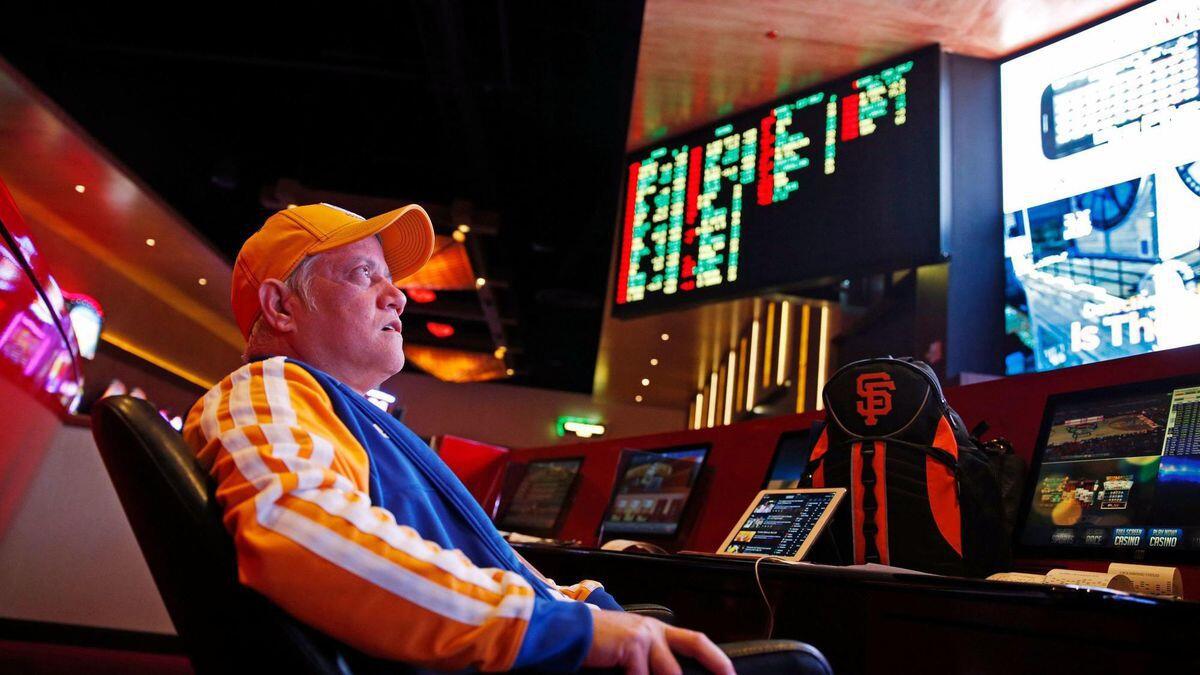To solve California’s coronavirus-fueled budget woes, Newsom should gamble on sports betting

- Share via
SACRAMENTO — If we legalize sports betting in California, schoolkids will be the winners.
Maybe also the aged poor. And working single moms looking for child care while schools are shuttered.
Practically every state legislator — Democrat and Republican — is attacking Gov. Gavin Newsom’s proposed draconian cuts in funding for K-12 schools, impoverished seniors, healthcare for the poor and a long list of safety net programs.
But very few are suggesting serious ways to blunt the governor’s chopping ax by raising new revenue — the dirty T-word for tax.
Two exceptions are Democratic Sen. Bill Dodd of Napa and Assemblyman Adam Gray of Merced. They’re proposing that California finally legalize sports betting — as 23 other states have done — and reap several hundred million dollars annually in “sin” taxes.
Nothing wrong with sin taxes. If people are sinning anyway — such as gambling on professional sports — the state might as well make money off it. Anyway, in many cases, there’s no public consensus on what constitutes a so-called sin.
We long have taxed liquor and tobacco. Four years ago, we fully legalized marijuana and now are taxing the drug. In 1984, Californians voted overwhelmingly to create a state lottery, which is providing $1.3 billion for K-12 schools — 1.3% of their total spending.
I don’t bet on sports because I like to enjoy the games for their own sake and not get hung up on whether the point spread is going to affect my wallet. I want Clayton Kershaw to pitch a shutout; bleep the betting line.
But not everyone shares that view, so why not make sports gamblers pigeons for the tax collector?
Dodd and Gray figure their proposed state constitutional amendment, SCA 6, would generate at least $200 million in taxes the first year and between $500 million and $700 million annually once the legal wagering market is developed.
That’s only a small piece of the state revenue puzzle, but as Dodd says: “Our state budget is being hammered. There are lots of victims. We have to find as many sources of revenue as possible. And here’s one with real money.
“There’s already billions of dollars of illegal sports gambling going on in the state. There’s no regulatory framework. There’s no taxation.”
Last week, the Assembly held a very rare “committee of the whole” — the last time was 25 years ago — to hear and question experts about the state’s budget plight. The governor projects a $54-billion deficit because the economy was essentially shut down when people were confined to their homes to slow the spread of the coronavirus.
The four-hour session quickly turned into a bipartisan platform for dumping on Newsom.
Democratic Assemblyman Kevin McCarty of Sacramento called the budget cuts a “death knell” for early-childhood education.
Newsom has promised to rescind $14 billion in proposed cuts if Congress and President Trump send the states a bailout package. Many legislators feel that’s an unrealistic pipe dream, especially given Trump’s past antagonism toward California.
That “feels like an over-dependence on the federal government with an unpredictable administration,” said Healdsburg Democratic Assemblyman Jim Wood, a dentist. “If you are aged, poor or disabled, this budget is devastating.”
Gray was about the only Assembly member who stood up with some partial solutions. He suggested sports betting and some other revenue-raisers.
Lottery winnings aren’t currently taxed by the state, although they are by the feds. Gray would tax winnings exceeding $1 million and earn the state between $40 million and $400 million a year, depending on the players’ luck.
“If you won $100 million, you shouldn’t complain about paying state taxes,” Gray says.
He’d stop allowing gamblers to write off losses against winnings in calculating their state income taxes. That could bring in between $300 million and $500 million.
Gray also would tax e-cigarettes at a higher rate than Newsom proposes, netting an additional $70 million.
“Before we start cutting schools and healthcare, we should take stock of our revenue options,” Gray told me. “It’s the responsible thing to do. It’s a mistake to sit back and wait for Congress to solve our problems.”
Two Republican assemblymen, Kevin Kiley of Rocklin and Vince Fong of Bakersfield, proposed grabbing roughly $3 billion in bullet-train project money and giving it to schools. Legally that’s possible. Politically it’s improbable.
The sports betting measure would allow wagering only on pro games. A bettor would need to be at least 21. The authors say major sports leagues support the proposal.
But the measure doesn’t have high odds of passing the Legislature and getting on the November ballot. For starters, it requires a two-thirds majority vote of each house.
Big Indian gaming tribes don’t like its main feature: online betting from the convenience of the bettor’s home. They want people betting inside their casinos.
The tribes were sponsoring their own ballot initiative, but collection of voter signatures collapsed because of the coronavirus. Now they won’t be able to qualify a measure until the 2022 ballot.
The Dodd-Gray proposal seeks a compromise among the long-warring tribal casinos, horse racetracks and card rooms. Casinos and racetracks could operate sports betting — in-house and online.
Card rooms would be excluded, but they’d also benefit. Their current card games would be cemented into law, safe from the constant assaults of tribes and the state attorney general.
The measure is unlikely to pass unless the three gambling interests agree to play. They’d win and so would California budget victims.
More to Read
Sign up for Essential California
The most important California stories and recommendations in your inbox every morning.
You may occasionally receive promotional content from the Los Angeles Times.














